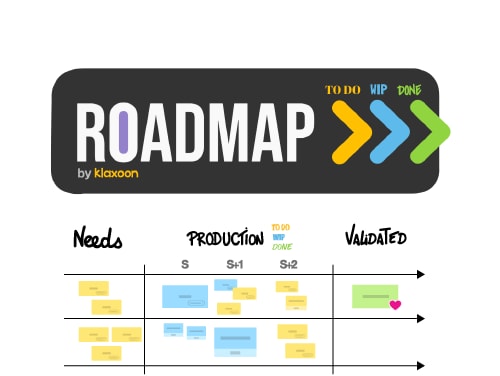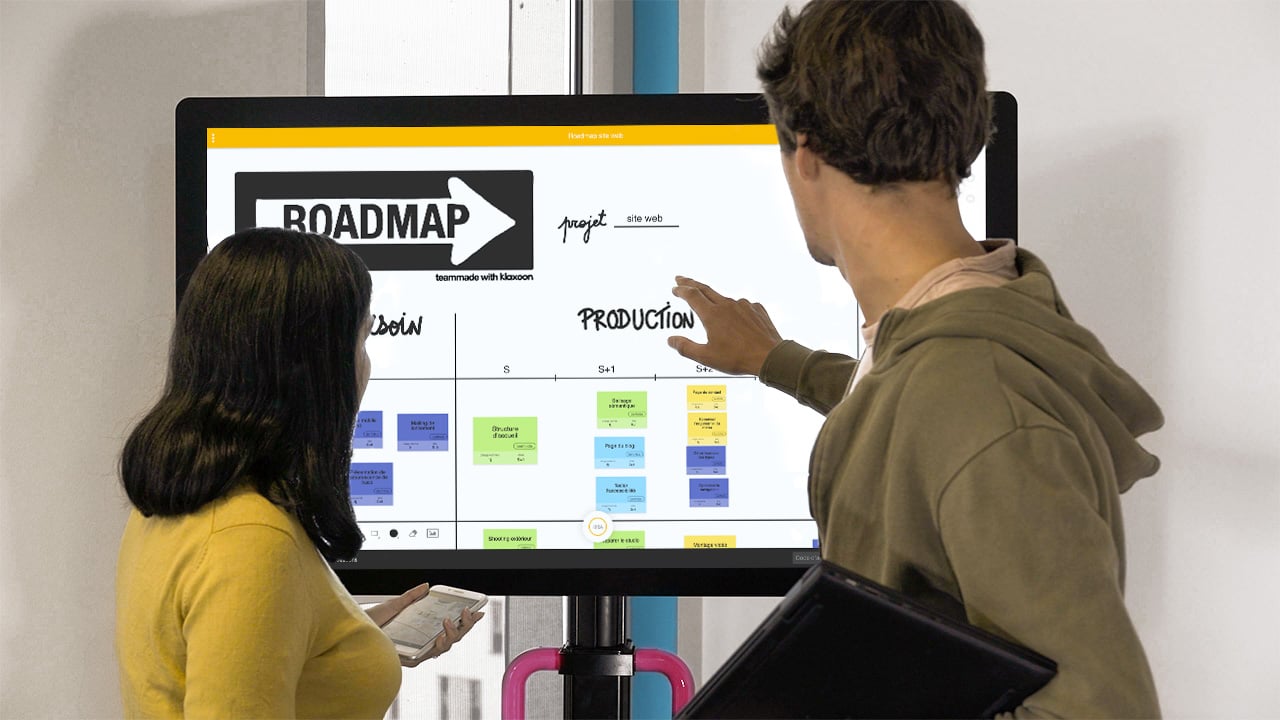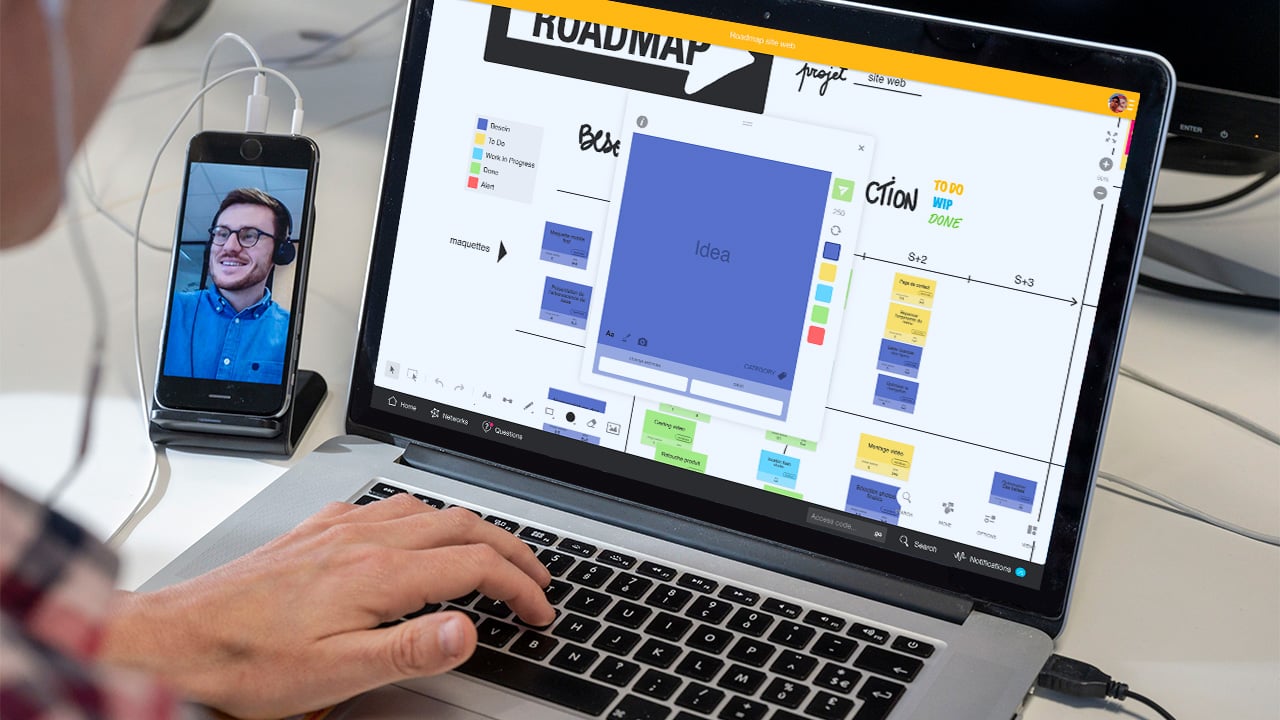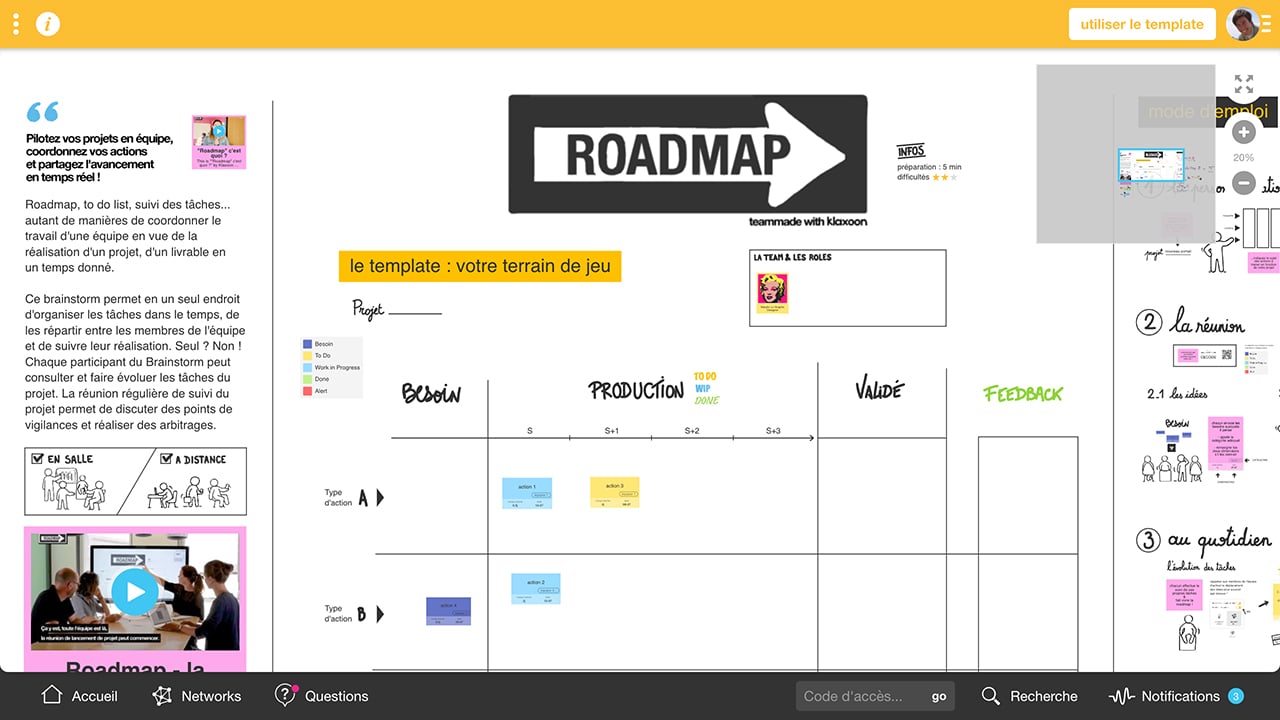Roadmap: The visual workload map for a project
Published on September 18, 2025
Roadmap: The visual workload map for a project


With the Roadmap template, manage your projects as a team, coordinate your actions, and follow your progress in real time. Roadmaps, to-do lists, monitoring tasks, etc. There are so many ways to coordinate your team's work toward a production delivery to meet your deadlines. This Board helps you to organize the tasks, schedule them, assign them to the team members, and follow their progress, all in one place.
When you want to complete projects as a team, it is important for each member to have the same amount of information at all times thanks to an efficient flow of information from and to all alike. But this is easier said than done for teams working in hybrid mode, with some at the office and others at home or other remote locations, when remote meetings become the order of the day.
The Roadmap template is an agile visual management tool. With its table of daily to-dos, objectives, needs, action allocations, Roadmap will soon become you and your team’s favorite project management meeting place. Its usefulness far exceeds that of classical project meetings tools. It allows you to revisit your team descriptions of the ‘way forward’ – even after a single meeting – to keep track of project progress, identify trouble spots, all in a very user-friendly way.
This article explains how to draw up a Roadmap project that guarantees project management success.
If you’ve never travelled on a road, or never been to a place, how will you avoid getting lost on the way there without a Roadmap? You need the big picture. A bird’s-eye view. A visual layout, accessible in an instant, whenever needed. A task management document. Best is, you work it out as a team, each member participating fully, right from the outset of the journey. Thereafter you consult your Roadmap at every twist and turn. That way you all know where you’re project’s at every step of the way.
But how does Klaxoon’s Roadmap differ from other more traditional project action plans? Well, though they all contain similar information, Roadmap offers a higher vantage point than standard task planning tools. It avoids going into too much detail, and offers each team member the liberty of consulting it whenever they want to keep track of progress. So, Roadmap zooms in on the overall objectives and desired outcomes of projects, and on deadlines. But unlike project action plans, it doesn’t look too closely at the operational aspects of projects.
Whether you organize in-house or remote meetings with your team, using Roadmap offers you many advantages, starting it being an asynchronous template, but also because:
So, having a Roadmap really is a way of ensuring more intuitive and accessible project management. If you fill out the template correctly and keep it up to date, in the wink of an eye you will know exactly what’s to be on each meeting’s agenda (whether it involves time, resources or risk management, or any other aspect).


For your Roadmap to be effective, it must include a minimum number of things. The first is that it needs to offer its users a big-picture project management view. Of the milestones. And of the final destination. Of the time spent on the road. And of the time to reach the end. Each member must know where you started, where you’re at now. How the project is doing. All the time. And naturally to what extent each stage of the journey’s predefined and continuously defined outcomes have been met.
The Roadmap should also point out hazards and risks. When you know of pitfalls, you can avoid them, or fix them early on (which assures permanent project progress). It will help you reaching your destination with delays. Or not at all.
We’ve included a sample project in the Roadmap template for users who want to have a better idea of what a project roadmap should look like. And if that whets your appetite for more than project maps, also have a look at our wide range of other project management templates.
No single person can draft your Roadmap. It’s the work of a team. Each and every member. Which is why it’s essential that you organize a brainstorming session that will end in everyone enthusiastically joining the journey.
Fortunately, with an intuitive, interactive meeting tool like Roadmap, getting your colleagues together in a single spot has never been easier. Whether you organize the session at work or as a videoconference (or both), participation is easy and efficient thanks to the idea-generation tools we designed for you. For example, Board by Klaxoon allows the use of either text, picture or drawings.
A brainstorming session really is the best way to create a functional, efficient Roadmap. It allows all stakeholders to put forward their priorities and together create a task planning tool that will prove to be both realistic and motivating – while enjoying the whole team’s buy-in.
At your brainstorming session, the first step involves all members submitting their ideas on how to get from objectives to real outcomes. You then discuss and assess the ideas. This will likely result in the revising of milestones and combining of similar ideas into one, which is all part of the creative process needed to design a Roadmap. The finetuning assures that your project remains realistic and sustainable over time.
The best advice we can give you for your Roadmap design, is that you avoid vagueness and imprecision. For example, a failure to allocate tasks or to clearly define objectives risks throwing your project off the track, or seeing it called off altogether.
This bears repeating. A successful project management Roadmap depends on clear objectives and strategies, and on clear task allocating. One task, one person responsible for it. Likewise, objectives need to be realistic, achievable, on time. This will help your team remain motivated, and not miss deadlines. So, right from the start, keep objectives viable.
And don’t forget that your Roadmap is a visual aid supposed to display your big picture in a click. So, avoid too much detail in task descriptions. Overload in visual project management will get you stuck in the mud along the way (or all the way).
Finally, deadlines too are easy to set in the Roadmap template. Simply switch to list mode to display actions according to due delivery dates. This helps you remain mindful of the order in which the project is to progress. The template automatically organizes actions by order of priority.
An additional great advantage of Klaxoon’s Roadmap is that it normally soon turns into an asynchronous document. Meaning that team members spontaneously start consulting it very regularly. For example, users find Roadmap particularly helpful for things like preparing project progress reports, staying informed of work in progress and upcoming tasks, or simply finding trouble spots.


Roadmap is a product of so-called agile methods. It involves teamwork between all members, and promotes dialogue between project managers. But an agile Roadmap goes farther still in that it allows flexibility in task definitions, meaning they get improved and streamlined constantly (and not infrequently scrapped altogether).
So, with a groupwork online whiteboard like Roadmap, every project team member can access the document at will (or example to inform the rest of the team that he/she has completed a task). To that end, the member will change the color of the post-it allocated to the task from blue (‘WIP’) to green (‘Done’). Next, he/she takes on a new task, shifting it from yellow (‘To-Do’) to blue (‘WIP’). The color codes of the agile Roadmap thus visually inform the whole team of the latest project status. It proves psychologically satisfying for employees to reach milestones where they may flip the post-its from yellow to blue to green as the Roadmap journey winds it way to the intended final project outcome.
But what to do when problems appear, as they inevitably will? That’s what you need Roadmap follow-up meetings for, to check up on the status of tasks. Roadmap allows teams to freely choose how often they want to meet. Meetings will always remain indispensable for good project management. Meeting too infrequently risks seeing the project ending in failure.
Whether you meet remotely or at work, it’s vital that all team members attend each project meeting. Meetings offer colleagues a chance to discuss tasks successfully carried out. But also the problems they encounter. Meetings are thus an opportunity for teams to look for solutions, together. The Question tool available on Board by Klaxoon allows each member to tender solutions. It might, for example, involve assigning the task to someone else, or increasing the resources (human or financial) allocated to the task.
Team meetings are also the place where you summarize feedback on work done or still in progress. It’s important that tasks be discussed orally, to give all an opportunity to understand and personally grow along with the project.
The Roadmap template offers you an agile visual management toolkit that plots your project objectives onto a single document. You plan. You adjust. All in the matter of clicks.


Get inspired by other templates from the same categories
Unlock your teamwork potential